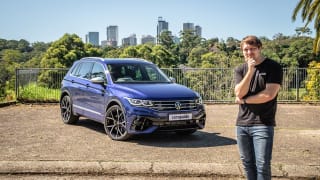
Volkswagen Tiguan R 2022 review
In the era of both the dominant SUV and the performance sub-brand, is the Tiguan R the ultimate car?
Browse over 9,000 car reviews
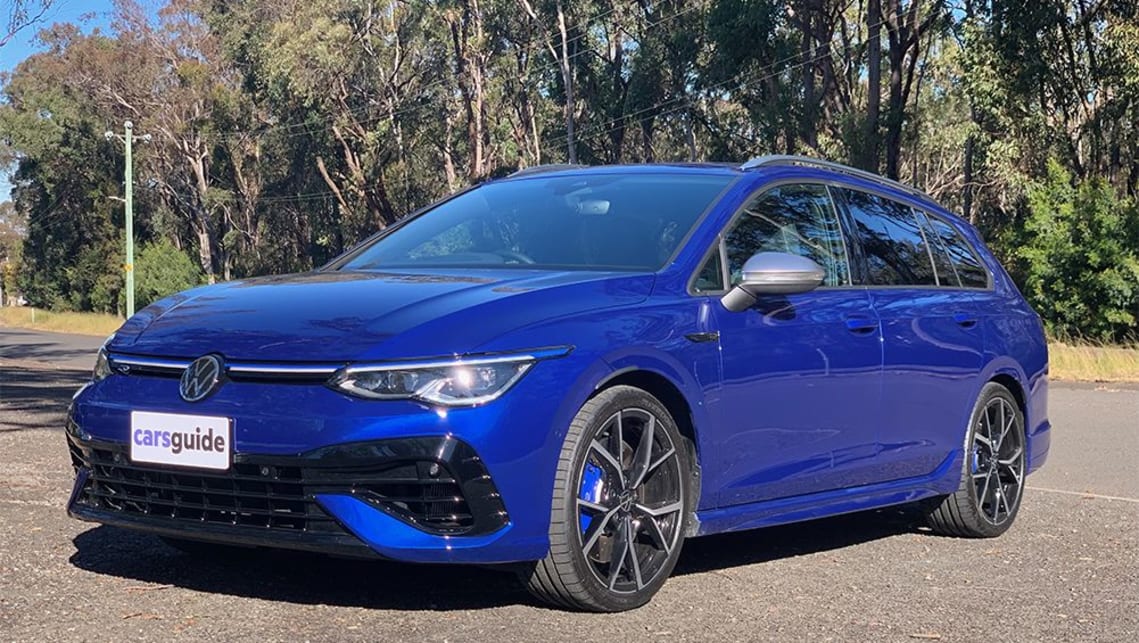
The Volkswagen Golf R Wagon is one of the best kept secrets of the automotive world. It offers immense practicality, speed to burn, all-wheel-drive traction and a level of sophistication that other brands just can’t match.
And, it’s a wagon - so, what’s not to love? Well, this new-generation Mk 8 Golf R wagon is now considerably more expensive than before, and there are some things that aren’t as easy to live with as they were in the last-gen version.
Read on to find out what’s good about it, what’s better than ever, and what I think could be better.
| Volkswagen Golf 2022: R 4Motion | |
|---|---|
| Safety rating | |
| Engine Type | 2.0L turbo |
| Fuel Type | Premium Unleaded Petrol |
| Fuel Efficiency | 7.4L/100km |
| Seating | 5 seats |
| Price from | $63,910 |
You’re getting a lot of car if you buy a Volkswagen Golf R Wagon, but you’re also paying a lot of money for it. More than ever before, in fact.
The new-generation Mk 8 Golf R wagon has a list price of $68,990 (MSRP - before on-road costs). That’s some $11,000 more (or 19 per cent!) more expensive than the outgoing Mk 7.5 model.
And you don’t even get a sunroof as standard! You need to pay an extra $2000 for that. And if you want the premium sound system - a Harman Kardon stereo with nine speakers and a subwoofer - that’ll add a further $1000 to the price.
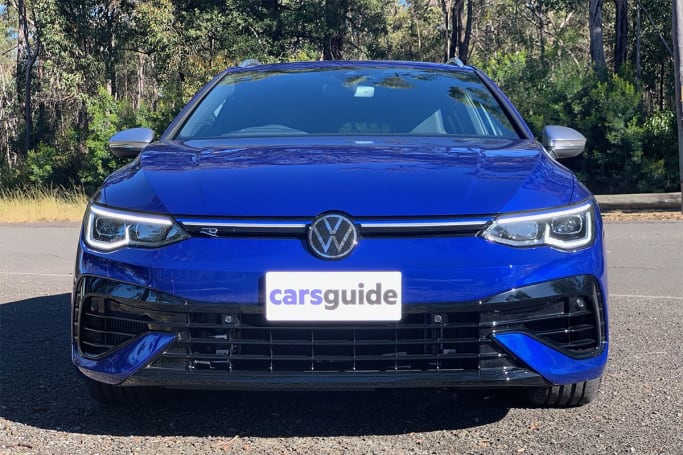
Some reprieve when it comes to colour choices, though. There are only three - Lapiz Blue, Pure White or Deep Black - and all come at no additional cost.
So what else are you getting for your money? The standard equipment list is long, comprising: the VW R Performance package with Drift and Special driving modes, 19-inch alloy wheels, adaptive suspension, Matrix LED headlights with auto high-beam and cornering beams, LED DRLs with grille strip, LED tail-lights with dynamic blinkers, keyless entry with push-button start, auto electric boot opening/closing, tinted rear and side windows, and chrome roof rails.
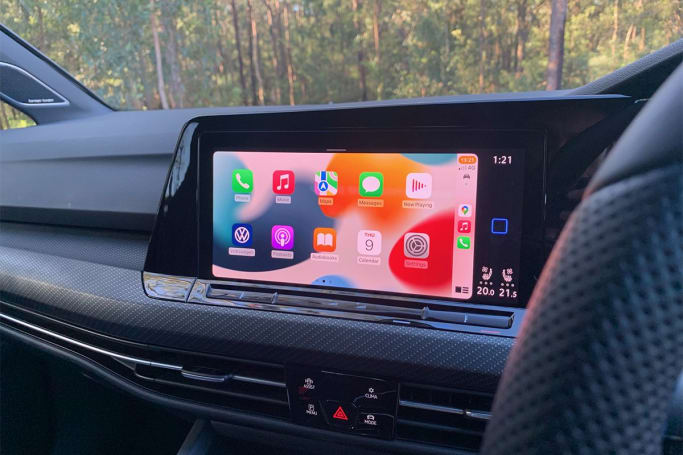
Inside you score three-zone air-conditioning, Nappa leather interior trim, heated and cooled front seats, electric driver’s seat adjustment (manual for front passenger!), auto lights, auto wipers, auto-dimming rear-view mirror, ambient lighting in the cabin, and a heated sports steering wheel with paddle shifters, and there’s adaptive cruise control.
Multimedia is by way of a 10.0-inch touchscreen with sat nav, a reversing camera, DAB+ digital radio, wireless smartphone mirroring (Apple CarPlay and Android Auto), 4x USB-C ports, and there’s voice control, too. The driver has a head-up display for critical info, and there’s a fully digital instrument display for the driver, too.
More details on the safety gear can be found below, but highlights include high speed front AEB, rear parking speed AEB, and surround parking sensors.
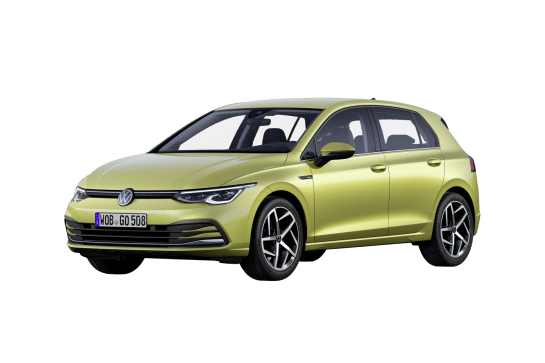
I love a wagon. If you don’t, you need help.
I’ve always loved the Golf R wagon’s understated sporty elegance. And this new generation model has a bit more of a lary, curvaceous take on the theme - with smoother edges, a more pronounced, almost moustache-like look to its front bumper, and Tiguan-ish rear lights and telltale quad exhaust pipes.
It looks fast, plush, and pretty good if you ask me. But I’d have it in white, not blue. And, if I’m honest, I liked the more understated exterior of the last-gen version more than this one. Do you agree? Hit the comments section with your thoughts.
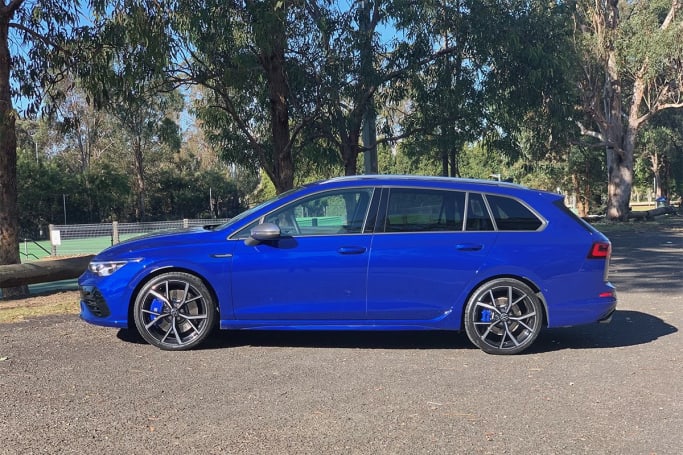
As for the interior? Well, this generation of Golf has been criticised widely for its mix of cheap plastics and difficult media screen controls, and nothing has changed in the top-spec wagon there.
There are still some trims and materials that don’t align with the price tag, and while I’m sure you get used to the controls for the screen, they’re nowhere near as good as the last Golf R, which had simpler buttons, knobs and dials, and didn’t require you to crash through multiple menus to make minor adjustments. More on that in the next section.
Thinking the new VW Golf Wagon looks a fair bit bigger than the humble five-door hatch model? You’re bang on. It’s a lot larger than any Golf that has come before it, measuring 4644mm (up 354mm on the hatch) and rides on a longer wheelbase than the hatch too (2681mm - up 50mm). Measuring up your garage to see if it’ll fit? The width is 1789mm and it is 1466mm tall (which is 8mm taller than the hatch).
As a result, the practicality on offer in this Golf far exceeds all other Golfs that have come before it. It’s big inside. Like, it has a boot capacity of 611 litres (VDA) - meaning it has 237L more than the hatch. That’s a whopping 64 per cent more boot capacity.
Take note, that while that is a lot of boot space (check out our boot capacity images with and without our CarsGuide hard luggage set for reference), and while there are storage areas either side of the boot for additional loose item stuff, and while there is a retractable cargo blind cover, there is no spare wheel. Not even a space saver.
Back seat accommodation? Also pretty good. With the driver’s seat set for my 182cm/6’0” frame, I had enough space behind, with good knee room, ample headroom and decent shoulder space.
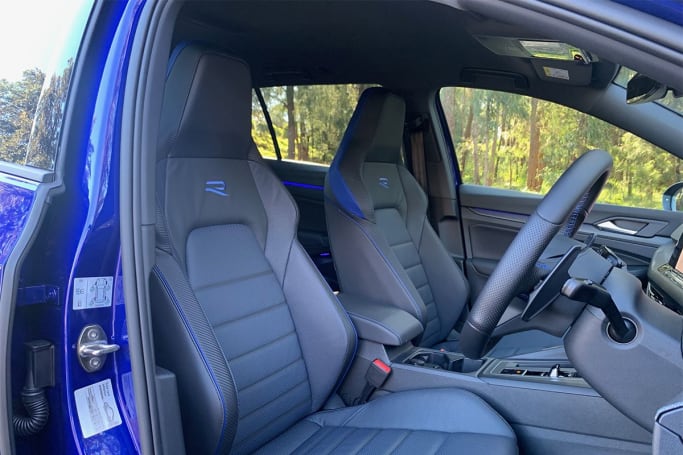
Kids are sorted with ISOFIX child-seat anchor points in the window seats, and three top-tether anchorages as well. I set up my rearward facing 0-4 baby seat and had ample space in the passenger seat ahead of it.
There are good amenities in the back, too, with directional air-vents, 2x USB-C charge ports, map pockets in the seats, a fold-down armrest with cup holders, and lined/flocked door pockets, which I love because it means loose items don’t rattle around in there.
Up front the storage situation is also pretty good. There are lined door pockets (they’re bigger in the front doors) big enough for bottles, a pair of central cup holders, a small (actually quite tiny) centre console box, a reasonable glovebox, and a clever tray ahead of the shifter to store your phone - it’s a clamshell shelf, where you can stow your phone while it’s wireless charging, and store stuff on top of it on the second shelf. Neat.
The sports bucket R seats are lovely, offering plenty of support, comfort and adjustability. The driver’s seat base is a little higher than some people might like (I would have appreciated being sat an extra centimetre or two lower) but I got used to it.
What I couldn’t get used to was the media system interface. It’s different to the Skoda Octavia RS long-termer I had last year, and not in a good way.
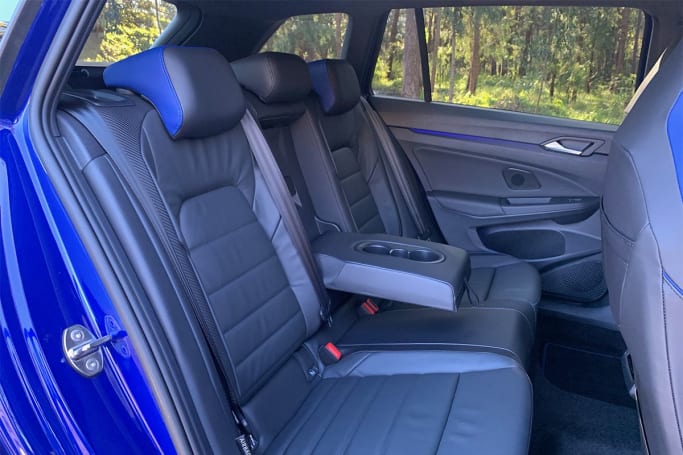
The system seemingly has screens upon screens of menus, with only a few hard buttons to help you get around. That means a few presses of the touchscreen will be required to turn on the recirculation air-con, for instance, or to adjust the seat heating. That’s a bit silly, as buttons would do a better job of it.
Then there’s the design of the temperature controls - a haptic-style slider bar that sits below the screen and, extremely shortsightedly, isn’t backlit. So, if you’re driving at night, you’ll be left to guess what you’re doing on that bottom slider. Further, the middle part of that bar is also where you’ll find the volume controls - which is silly. A knob would be so much better for it.
It looks and feels like a means of cost-cutting compared to the last-gen model’s media system. Sure, that version was lower-res, didn’t have as much connectivity, and didn’t have the “sleek” plasticky surround that this one has… but it had better usability, buttons and dials to make sure you’re not bumping things you don’t want to when you’re driving, and frankly, I think it looked more premium.
Another thing that I couldn’t come to terms with was the steering wheel controls. There are too many things to press. I don’t need cruise control, volume, lane keeping tech, R drive mode, menu selectors, info screen view controllers, heated steering wheel, voice control and track-change buttons all to be within one press on the steering wheel. In fact, I accidentally hit the next track button several times, which when you’re 20 mins into an hour-long podcast, can be super frustrating.
This maximalist approach to the steering wheel buttons is seriously at odds with the minimalist screen controls, and I can’t understate just how much better the MK7.5 Golf was from a user-interface perspective.
This is quite the beating heart.
A 2.0-litre four-cylinder turbo-petrol engine producing 235kW of power (from 5200-6000rpm) and 420Nm of torque (from 2000-5500rpm) means there’s a huge lump of linear power available to the driver.
The petrol engine is teamed to a seven-speed dual-clutch automatic transmission (DSG in VW-speak), and of course, it has the brand’s 4Motion all-wheel drive system with R-Performance Torque Vectoring. It’s a new take on the brand’s AWD setup, using two multi-plate clutches at the rear axle and clever torque vectoring tech that can allow up to 100 per cent of torque to be fed rearwards. The new Drift Mode pushes extra torque to the outside rear wheel to make it easier to commence and continue a slide - it is designed for track situations (there’s even a “promise you’re not being silly in public” style disclaimer on the screen). Sad to say, I wasn’t driving this car on a track.
The claimed 0-100km/h sprint is just 4.9 seconds - 0.1 sec slower than the hatch, despite the wagon weighing in 82 kilograms heavier (1583kg).
A performance car needs the best fuel, so you best be sure your servo has the 98RON premium unleaded available. You need to use that because it’s the only fuel suitable for the car’s standard-fit, emissions-stifling petrol particulate filter.
The official combined cycle fuel use figure of 7.4 litres per 100 kilometres is likely fanciful for most fans of this sort of car. Fun fact for the pub - the wagon has a lower claimed fuel use figure than the lighter hatch model (7.8L/100km).
On my test, which comprised lots of highway, urban and some spirited driving, I saw a real-world figure of 9.7L/100km.
You might have seen the VW Golf range has scored the maximum five-star ANCAP rating, and that was against 2019 criteria. Things have changed a bit since then, and the rules for achieving five-star scores are always getting stricter, but the Golf R Wagon seems to have plenty going for it.
Alongside front AEB with highway and city speed operation with pedestrian and cyclist detection, there’s lane-keeping assist, blind-spot monitoring, rear cross-traffic alert, adaptive cruise control with “Traffic Jam Assist”, semi-autonomous self-parking tech, and driver fatigue monitoring. There’s also rear AEB to stop you colliding with obstacles when reversing.
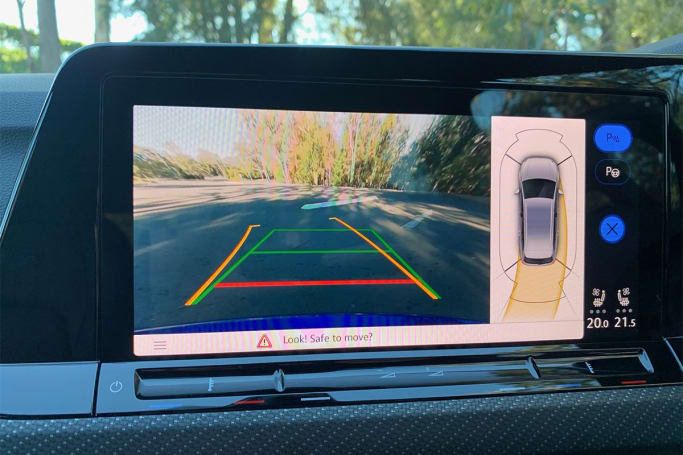
Airbags consist of dual front, front side, rear side and full-length curtain coverage.
What’s missing, then? There’s no surround-view 360 degree camera, which is becoming more commonplace these days, and no front-centre airbag coverage which some newer-generation cars offer.
Basic Warranty
5 years / unlimited km warranty
ANCAP Safety Rating

The Volkswagen ownership experience comprises a five-year/unlimited kilometre warranty, which is the standard for most brands these days.
There’s capped-price servicing, which you can pay as you go, or buy a prepay plan. The plans can be had for three years ($1700 - correct when published) or five years ($3000, first service is free). If you prepay on the five-year plan, you’ll save $833 compared to the “Assured Service Price” pay as you go method.
You get a year of roadside assistance included when you buy new, and it renews up to nine years if you maintain your car with VW.
There aren’t many other wagons… actually there aren’t ANY other wagons that can do what the VW Golf R Wagon can for the money.
It’s not just composed and comfortable when you want it to be, it can also turn into a menacing machine - a grippy, corner-carving powerhouse - at the press of a drive mode button (or several presses of the touchscreen or an accidental press of the steering wheel haptic control button… ahem!).
It’s that ability to essentially be all things to all people, that makes it one of the most compelling drive experiences for the money. Yes, it is a lot more money than it used to be, but it’s arguably stepped up its on-road driving game to match that price.
The 2.0-litre engine is a rich, nice-revving unit. It offers Excellent power delivery above 2000rpm, though there can be some lag below that point. Not that it really matters, unless you’re doing mainly urban grind commuting.
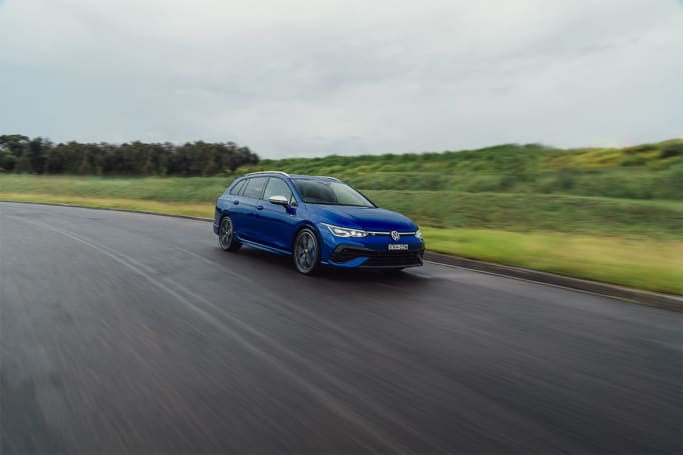
The dual-clutch auto is well sorted and nicely calibrated, and it’s not even too much of a pain in urban driving as some examples can be. It holds gears really nicely, and offers snappy shifts no matter the drive mode you’re in (the snappiest are in the most aggressive modes), however, I noticed that on cold starts the engine and transmission could be a little jerky.
On the topic of those drive modes, there are Comfort, Sport, Race and an Individual mode that allows you to select the parameters of your drive experience. I liked this setting for a slightly more comfort-oriented suspension damper setting, while keeping the engine at a tenser, more aggressive setting.
As mentioned earlier, there are special drive modes as well - Nurburgring and Drift - though I followed the recommendations and didn’t engage them on my “real world” drive test.
Even so, in Sport and Race I found there was tenacious traction available, and the body control was terrific. The tyres - I was surprised to note - are Hankook Ventus S1 evo3 rubber in 235/35/19 size, and while they offered good enough grip on my testing loop, I would personally prefer something with just a bit more bite. They used to fit Continentals to the Golf R…
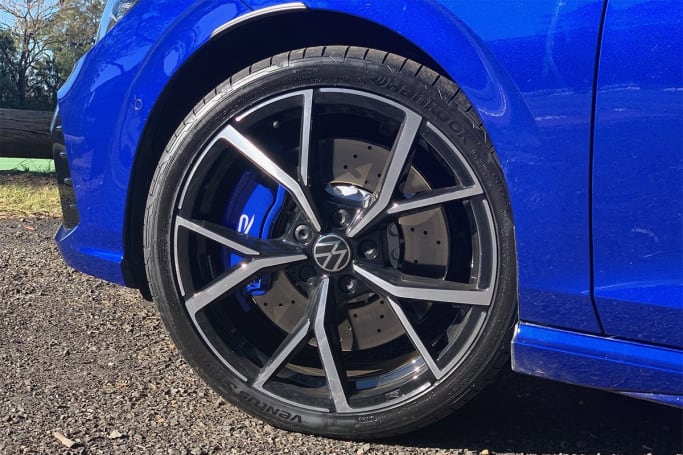
The steering is lovely, offering a nice mix of lightish feel and feedback, but also urban friendly in how light it can be in the most sedate drive modes. The more hardcore enthusiast might wish for just a tiny bit more pointedness at the nose and feel through the wheel, but for most people who buy the Golf R Wagon, they’ll realise it has more than just one job to do.
What I wish there was more of, this time around, is aural drama.
Under hard acceleration the 2.0L engine doesn’t offer exactly the most acoustically pleasing sound, and while the drive modes can “enhance” the sound in the cabin, and while there is some slight exhaust pop and crackle in the racier moods, it’s not quite as chest-beating and theatrical as the last model from my recollection, and nor is it the show-off that the current Hyundai i30 N is.
That may or may not matter to you, though, and surely there’ll be some special edition with an Akrapovic exhaust at some point… right, VW?
Aside from that, there’s also some tyre noise to contend with, but it’s never to the point of frustration as can be the case in some other wagons with low-profile rubber (they can be like echo chambers).
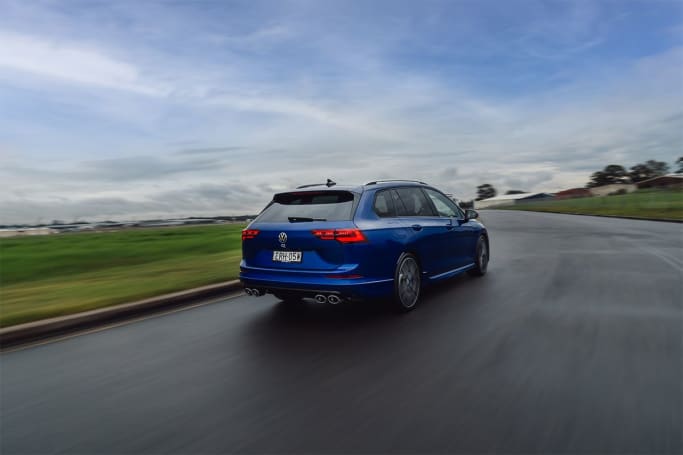
There’s plenty to be impressed by when it comes to the Mk8 Golf R Wagon. It is faster, more focused, and more practical than ever. But it’s also somewhat compromised in terms of its liveability, and it’s considerably more expensive, too.
There is no other wagon on the market for the money that can do all the things the new VW Golf R Wagon does… that much is clear.
But then again, you could also consider a pre-owned example of the last-gen model, which will set you back about half the price. Now, you’ll have to excuse me while I go check the listings on CarsGuide, Autotrader and Gumtree for Mk7.5 Golf R Wagons.
| Vehicle | Specs | Price* | |
|---|---|---|---|
| GTI | 2.0L, PULP, 7 SP AUTO | $49,830 – 57,310 | 2022 Volkswagen Golf 2022 GTI Pricing and Specs |
| 110TSI | 1.4L, PULP, 8 SP AUTO | $28,710 – 34,540 | 2022 Volkswagen Golf 2022 110TSI Pricing and Specs |
| 110TSI | 1.4L, PULP, 8 SP AUTO | $30,140 – 36,300 | 2022 Volkswagen Golf 2022 110TSI Pricing and Specs |
| 110TSI Life | 1.4L, PULP, 8 SP AUTO | $30,690 – 36,960 | 2022 Volkswagen Golf 2022 110TSI Life Pricing and Specs |
| Price and features | 7 |
|---|---|
| Design | 8 |
| Practicality | 8 |
| Under the bonnet | 9 |
| Efficiency | 8 |
| Safety | 9 |
| Ownership | 8 |
| Driving | 9 |
$30,990
Lowest price, based on 42 car listings in the last 6 months